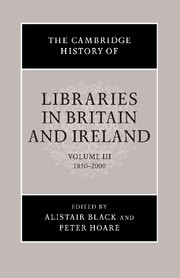Book contents
- Frontmatter
- Introduction: sources and methodologies for the history of libraries in the modern era
- 1 Libraries and the modern world
- Part One Enlightening the Masses: the Public Library as Concept and Reality
- Part Two The Voluntary Ethic: Libraries of our Own
- Part Three Libraries for National Needs: Library Provision in the Public Sphere in the Countries of the British Isles
- Part Four The Nation's Treasury: Britain's National Library as Concept and Reality
- Part Five The Spirit of Enquiry: Higher Education and Libraries
- 26 Introduction: Higher education and libraries
- 27 The libraries of the ancient universities to the 1960s
- 28 The libraries of the University of London to the 1960s
- 29 The Civic universities and their libraries
- 30 Academic libraries and the expansion of higher education since the 1960s
- Part Six The Rise of Professional Society: Libraries for Specialist Areas
- Part Seven The Trade and its Tools: Librarians and Libraries in Action
- Part Eight Automation Pasts, Electronic Futures: the Digital Revolution
- Bibliography
- Index
- References
28 - The libraries of the University of London to the 1960s
from Part Five - The Spirit of Enquiry: Higher Education and Libraries
Published online by Cambridge University Press: 28 March 2008
- Frontmatter
- Introduction: sources and methodologies for the history of libraries in the modern era
- 1 Libraries and the modern world
- Part One Enlightening the Masses: the Public Library as Concept and Reality
- Part Two The Voluntary Ethic: Libraries of our Own
- Part Three Libraries for National Needs: Library Provision in the Public Sphere in the Countries of the British Isles
- Part Four The Nation's Treasury: Britain's National Library as Concept and Reality
- Part Five The Spirit of Enquiry: Higher Education and Libraries
- 26 Introduction: Higher education and libraries
- 27 The libraries of the ancient universities to the 1960s
- 28 The libraries of the University of London to the 1960s
- 29 The Civic universities and their libraries
- 30 Academic libraries and the expansion of higher education since the 1960s
- Part Six The Rise of Professional Society: Libraries for Specialist Areas
- Part Seven The Trade and its Tools: Librarians and Libraries in Action
- Part Eight Automation Pasts, Electronic Futures: the Digital Revolution
- Bibliography
- Index
- References
Summary
The beginnings of the university
Following the end of the Napoleonic war, London was pre-eminent among the capitals of Europe. This pre-eminence, however, had been secured, above all, by the exercise of military, maritime and financial power. For the liberal and progressive groups in the city, victory in war was not in itself enough. In England, at that time, higher education was monopolised by the ancient universities of Oxford and Cambridge, which were traditional, complacent, and socially and religiously exclusive. Further afield, most of the great cities of mainland Europe had long had universities, for example Amsterdam (since 1632), Lisbon (since 1288), Madrid (since 1508), Rome (since 1303) and Vienna (since 1365).
During the 1820s, the poet Thomas Campbell and the politician Lord Brougham led an initiative which raised enough money to buy the site in Gower Street on which University College (henceforth UCL) was founded in 1826. Conservative opposition to this development was led by the archbishop of Canterbury, the duke of Wellington and Sir Robert Peel, and led to the founding of the rival King's College (henceforth KCL) in 1829. The inevitable controversy as to which of the two institutions should be accorded a royal charter, entitling it to award degrees, was resolved by the establishment of ‘the University of London’ in 1836, through which each of the colleges was required to present its students for graduation.
- Type
- Chapter
- Information
- The Cambridge History of Libraries in Britain and Ireland , pp. 345 - 356Publisher: Cambridge University PressPrint publication year: 2006



